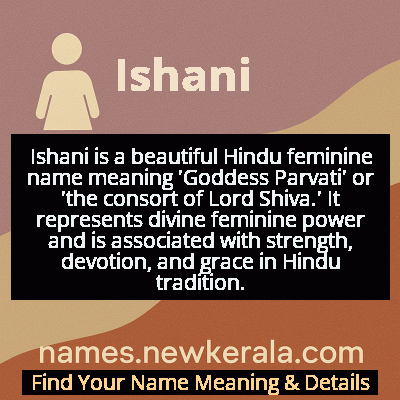Ishani Name Meaning & Details
Origin, Popularity, Numerology Analysis & Name Meaning of Ishani
Discover the origin, meaning, and cultural significance of the name ISHANI. Delve into its historical roots and explore the lasting impact it has had on communities and traditions.
Name
Ishani
Gender
Female
Origin
Hindu
Lucky Number
6
Meaning of the Name - Ishani
Ishani is a beautiful Hindu feminine name meaning 'Goddess Parvati' or 'the consort of Lord Shiva.' It represents divine feminine power and is associated with strength, devotion, and grace in Hindu tradition.
Ishani - Complete Numerology Analysis
Your Numerology Number
Based on Pythagorean Numerology System
Ruling Planet
Venus
Positive Nature
Harmonious, responsible, caring, and artistic.
Negative Traits
Overly idealistic, superficial, possessive, or jealous.
Lucky Colours
Pink, turquoise.
Lucky Days
Friday.
Lucky Stones
Diamond, turquoise.
Harmony Numbers
2, 3, 9.
Best Suited Professions
Artists, musicians, teachers, healthcare workers.
What People Like About You
Warmth, nurturing nature, artistic flair.
Famous People Named Ishani
Ishani Shrestha
Model and Beauty Queen
Miss Nepal World 2013 and first runner-up at Miss World 2013
Ishani Dutta
Actress
Bengali film actress known for her work in Tollywood cinema
Ishani K. Dutta
Scientist
Renowned researcher in biotechnology and plant sciences
Ishani Parekh
Entrepreneur
Founder of successful tech startup in Silicon Valley
Name Variations & International Equivalents
Click on blue names to explore their detailed meanings. Gray names with will be available soon.
Cultural & Historical Significance
Throughout Indian cultural history, the name has been associated with women of strong character, spiritual depth, and leadership qualities. In traditional households, naming a daughter Ishani is seen as invoking the blessings of Goddess Parvati for the child to embody virtues of strength, wisdom, and devotion. The name also reflects the cultural importance of the divine feminine principle in Hinduism, where goddess worship forms an integral part of religious practice. Regional variations in the name's pronunciation and usage demonstrate how it has been adapted while maintaining its core spiritual significance across different Indian communities.
Extended Personality Analysis
Women named Ishani are typically perceived as possessing a unique blend of strength and grace, reflecting their namesake goddess. They often exhibit natural leadership qualities combined with deep emotional intelligence and empathy. Ishani's tend to be determined and resilient individuals who approach challenges with a calm, strategic mindset. Their personality often includes a strong sense of intuition and spiritual awareness, making them insightful companions and advisors. Many display creative talents and artistic sensibilities, along with a natural elegance in their demeanor.
Ishani's are known for their loyalty in relationships and their ability to maintain harmony in difficult situations. While they can be fiercely protective of their loved ones, they typically express their strength through compassion and understanding rather than aggression. This balance of power and gentleness makes them respected and admired in both personal and professional circles. They often serve as pillars of support in their families and communities, offering wisdom and stability during turbulent times. The name's association with Goddess Parvati also suggests qualities of perseverance and the ability to transform challenges into opportunities for growth.
Modern Usage & Popularity
In contemporary times, Ishani remains a popular choice among Hindu families, particularly in India and diaspora communities worldwide. The name has maintained consistent popularity over the decades, experiencing a slight resurgence in recent years as parents seek traditional yet distinctive names with deep cultural roots. It ranks moderately in Indian baby name charts, with higher concentration in states like West Bengal, Maharashtra, and Gujarat. Urban professionals often choose Ishani for its elegant sound and strong cultural significance without being overly common. The name has gained international recognition through Indian celebrities, films, and diaspora communities, making it accessible while retaining its authentic cultural identity. Modern Ishani's are often well-educated, career-oriented women who successfully balance traditional values with contemporary lifestyles, reflecting the name's enduring relevance across generations.
Symbolic & Spiritual Meanings
Symbolically, Ishani represents the embodiment of divine feminine energy and the creative power of the universe. The name carries profound connotations of sovereignty, wisdom, and the ability to manifest one's desires through focused intention and spiritual discipline. It symbolizes the harmonious balance between strength and compassion, authority and nurturing – qualities essential for both personal growth and leadership. Metaphorically, Ishani represents the earth's fertility and the sustaining power of nature, reflecting Parvati's role as the mother goddess who nourishes and protects all creation. The name also signifies spiritual enlightenment and the journey toward self-realization, embodying the concept of inner strength that emerges from deep devotion and righteous living. In philosophical terms, Ishani represents the sacred union of individual consciousness with universal consciousness, making it a name that carries multi-layered spiritual symbolism relevant to both ancient traditions and modern spiritual seekers.

